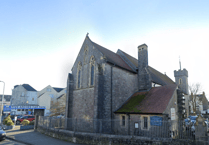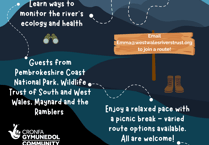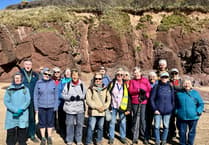A biography of Dr Wynne Samuel, one of Plaid Cymru’s early leaders and a prominent figure in the life of Tenby, has thrown new light on the party’s struggle to block the drowning of the Tryweryn Valley and secure a parliament for Wales.
Entitled ‘Pioneer Patriot - The Life of Wynne Samuel’, the biography by former party general secretary Dr Dafydd Williams describes Dr Samuel (1911-1989) as ’a man of immense talent who worked heart and soul for Wales’.
Despite a track record of loyal support for post-War Plaid leader Gwynfor Evans, the study reveals that Wynne Samuel was frequently at odds with the party leadership on key strategic questions - including defence of Welsh land from takeover by the military, the Parliament for Wales campaign of the 1950s and the fight to save the community of Capel Celyn in the Tryweryn Valley near Bala.
At one time considered a potential leader of Wales’ national movement, Wynne Samuel was brought up in Ystalyfera in the Swansea Valley and joined Plaid Cymru in 1928, three years after its foundation. In 1940 he was sacked by Swansea Council for refusing to sign a statement expressing full support for the war and began work as a full-time Plaid organiser in the South Wales valleys.
As a result his home branch in Ystalyfera grew to be the biggest in South Wales and set up an office in the town, Ty’r Werin, which continued for decades. In 1946, Wynne Samuel himself won one of Plaid Cymru’s first ever local government seats in South Wales - on Pontardawe Rural District Council - and his work laid the foundation for the growth of the national party in the South.
Later in life he practised as a barrister and went on to become Town Clerk of Tenby Borough Council. He also contested the Pembroke constituency for Plaid Cymru in the 1970 general election and helped found the party’s Tenby branch.
Just over half a century ago, in mid February 1968, the Tenby Observer reported that Wynne, in his role as candidate, had addressed the first ever meeting of Plaid Cymru’s Tenby branch in the Royal Lion hotel, writes Dr. Williams in his biography.
“There is no doubt of his effectiveness: Councillor Michael Williams relates how Wynne ‘wrecked his life’ in 1968 by persuading him to stand for Plaid in Tenby - a joke, surely, because half a century on Michael is still an active councillor!”, he adds.
“I venture to say that this period saw Wynne at the peak of his powers, both professional and political - leading the staff of a small local authority close to the heart of the community and yet still relatively free to campaign for Plaid Cymru," says Dr Williams, whose family moved to Upper Hill Park, Tenby in 1965.
“One day in the late 1960s I saw for myself the combination of all his interests - local government, the law and politics - when dressed in his legal robes he represented the council in Tenby’s De Valence Pavilion, fighting, successfully, to keep open the Pembroke Dock railway line.”
The new biography publishes a number of photographs and documents for the first time and can be found on the website of the Plaid Cymru History Society at: (http://www.hanesplaidcymru.org/?lang=en).




